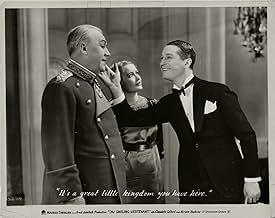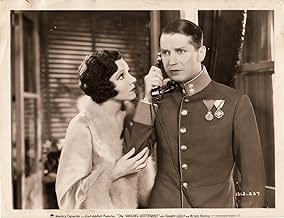NOTE IMDb
7,1/10
4,2 k
MA NOTE
Ajouter une intrigue dans votre langueAn amorous lieutenant is forced to marry a socially awkward princess, though he tries to keep his violin-playing girlfriend on the side.An amorous lieutenant is forced to marry a socially awkward princess, though he tries to keep his violin-playing girlfriend on the side.An amorous lieutenant is forced to marry a socially awkward princess, though he tries to keep his violin-playing girlfriend on the side.
- Nommé pour 1 Oscar
- 1 nomination au total
Charles Ruggles
- Max
- (as Charlie Ruggles)
Maude Allen
- Lady in Waiting
- (non crédité)
Granville Bates
- Bill Collector
- (non crédité)
Harry C. Bradley
- Count Von Halden
- (non crédité)
Carrie Daumery
- Lady in Waiting
- (non crédité)
Ludwig Heinsich
- Man
- (non crédité)
Cornelius MacSunday
- Emperor Franz Josef
- (non crédité)
Elizabeth Patterson
- Baroness von Schwedel
- (non crédité)
Janet Reade
- Lily
- (non crédité)
Werner Saxtorph
- Joseph
- (non crédité)
Karl Stall
- Master of Ceremonies
- (non crédité)
Robert Strange
- Col. Rockoff
- (non crédité)
Charles Wagenheim
- Arresting Officer
- (non crédité)
Histoire
Le saviez-vous
- AnecdotesA French version with dialogue and lyrics by Henri Bataille was shown in New York on 15 October 1931 and was also a big hit in Paris. It had the same three leading actors and was filmed at the same time as the English language version, as dubbing had not yet been invented.
- GaffesThe unpaid bill demands only 1614,25 crowns, even though the sum adds up to 1855,25 crowns.
- Versions alternativesA version in French with dialogue and lyrics by 'Henri Bataille (II)' played in New York City, New York, USA on 15 October 1931, and was a big hit in Paris. It probably was a dubbed English version, but slightly shorter at 2,476.80 m in length.
- ConnexionsFeatured in The House That Shadows Built (1931)
- Bandes originalesToujours l'Amour in the Army
(1931) (uncredited)
Music by Oscar Straus
Lyrics by Clifford Grey
Sung by Maurice Chevalier twice
Commentaire à la une
There is little to add to the praise this classic film has already received from professional and amateur critics and viewers. It is an object lesson in the art of filmmaking, cleverly conceived and plotted, gorgeously photographed, well acted by a colorful cast, constantly fresh and joyous, inventive and artful. The dialogue is brilliant, especially when it blossoms with playful double entendres. The mise-en-scene is filled with the engaging formalities so beloved by its director Ernst Lubitsch, and visual cues giving wordless information about plot and character. The contrast between the females, Miriam Hopkins and Claudette Colbert, is deftly arranged. Though Chevalier has charm to burn, his thick French accent does occasionally blunt the effect of the dialogue. But his light comedy skills are otherwise formidable and in conjunction with Lubitsch's staging and framing add up to cinematic magic. Colbert equals and even surpasses him with her own skill and charm. She gives particular oomph to her songs, acting them fully. Hopkins can be a grating performer but here tones it down. Her piano playing is impressive, whether it's real or not.
Meilleurs choix
Connectez-vous pour évaluer et suivre la liste de favoris afin de recevoir des recommandations personnalisées
- How long is The Smiling Lieutenant?Alimenté par Alexa
Détails
- Durée1 heure 33 minutes
- Couleur
- Rapport de forme
- 1.20 : 1
Contribuer à cette page
Suggérer une modification ou ajouter du contenu manquant

Lacune principale
What is the Spanish language plot outline for Le lieutenant souriant (1931)?
Répondre
































